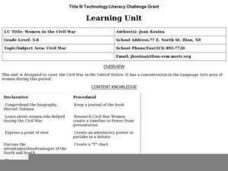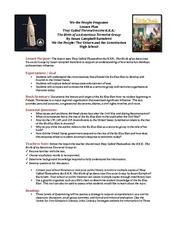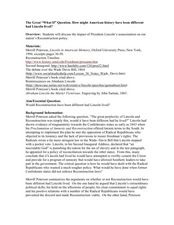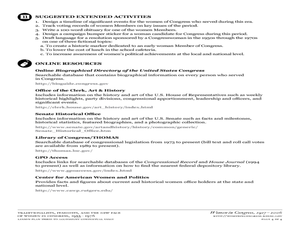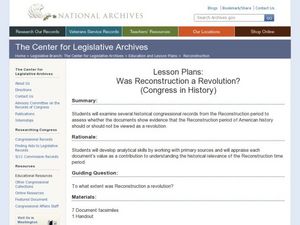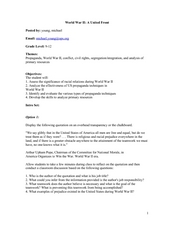US House of Representatives
Keeping the Faith: African Americans Return to Congress, 1929–1970
The third lesson in a unit that traces the history of African Americans serving in the US Congress examines the period from 1929 through 1970. After reading a contextual essay that details the few African Americans elected to Congress...
US House of Representatives
Permanent Interests: The Expansion, Organization, and Rising Influence of African Americans in Congress, 1971–2007
The fourth installment of the seven-instructional activity unit focused on African Americans elected to and serving in the US Congress looks at the period from 1971 through 2007. Class members read a contextual essay that provides...
Curated OER
Women in the Civil War
Students study the Civil War era in the US with a concentration on women during this time through literature and biographies. They create a timeline or multimedia presentation as one product of this series of lessons.
Curated OER
The Called Themselves the K.K.K.; The Birth of an American Terrorist Group
How did Ku Klux Klan develop and flourish in the US? How did the government respond to acts of terrorism conducted by the KKK following the Civil War? How does the government respond to acts of terrorism today? This resource launches a...
Curated OER
Jackie Robinson, Civil Rights Advocate
Students examine the life of Jackie Robinson and the ways in which he and they can influence government policy.
Curated OER
The Great "What If" Question. How might American history have been different had Lincoln lived?
Eleventh graders study the Presidency of Abraham Lincoln. In this American History lesson, 11th graders analyze documents related to Reconstruction. Students participate in a debate on Reconstruction.
John F. Kennedy Presidential Library & Museum
Analyzing the Inaugural Address
Get high school historians to step outside their own shoes by responding to JFK's inaugural address from the perspective of a civil rights activist, a soviet diplomat, or a Cuban exile. After a class discussion about the address, the...
US House of Representatives
“The Fifteenth Amendment in Flesh and Blood,” The Symbolic Generation of Black Americans in Congress, 1870–1887
The reading of a contextual essay launches a study of Black Americans who served in Congress from 1870 through 1887. Young historians identify the African Americans who served during this period, investigate the ways they won national...
Facing History and Ourselves
Interracial Democracy
Radical Reconstruction, the 10-year period referred to after Congress passed the Reconstruction Act of 1867, saw the establishment of manhood suffrage, men voting without any racial qualifications. Southern states also rewrote their...
PBS
Amid Rising Economic Inequality, Does America Need a Third Reconstruction?
Young political scientists investigate the Poor People's Campaign protest held in Washington, D.C., on June 18, 2022. They research how the event was reported in various news outlets and consider their stance on whether "poverty is...
Curated OER
Marching For Freedom
Students appreciate the sacrifices that people from across the country made to ensure that all citizens could exercise their constitutional right to vote. They access excellent websites and documents imbedded in this plan to guide their...
Curated OER
Change: Just a Matter of Time
Students analyze the Declaration of Independence and primary sources to explain civil rights. Then, students write a Declaration of Change to express the grievances of African Americans, and their desire to participate fully in the...
Curated OER
JUSTICE
Learners analyze the role that Alabama played in three major events of American History and how those roles contributed to Alabama being dubbed the "Cradle of the Confederacy" and the "Birthplace of the Modern Civil Rights Movement."
Facing History and Ourselves
Violence and Backlash
Revolution and counterrevolution. Protest and counter-protest. Collaborators and bystanders. The focus of the fifth resource in the Reconstruction Era and Fragility of Democracy series is on the political violence that followed Radical...
Curated OER
The Battle Over Reconstruction: The Aftermath of Reconstruction
Students examine the Reconstruction Era. In this American history activity, students explore the condition of the United States following the Civil War as they read statistical data. Students analyze the Reconstruction policies to...
Curated OER
A Changing of the Guard: Traditionalists, Feminists, and the New Face of Women in Congress
Students explore the role of women as Congressional leaders. In this women's rights lesson, students identify and investigate the impact of women representatives and senators in the U.S. Legislative Branch. Comprehension questions, data,...
Curated OER
The Autobiography of Miss Jane Pittman: Novel Guides
Learners create a timeline listing major historical events of the years 1860-1960. They discuss concepts central to the novel, such as freedom, self-respect, courage, and responsibility.
Curated OER
The Sixties Protests and Social Change
Students identify, examine and analyze photographs of the sixties to determine the forces of social change at work in America during this decade. They determine the goals of each movement and the methods used by each to achieve those goals.
Curated OER
Was Reconstruction a Revolution?
Students interpret historical evidence presented in primary and secondary resources. In this Reconstruction activity, students research details pertaining to Congress's role in Reconstruction. Students use the provided worksheets to...
Curated OER
The Reconstruction Period
Young scholars use documents and other resources to evaluate the success or failure of the Reconstruction for giving rights to African Americans. The documents are primary resources with questions included for students to complete.
Curated OER
World War II: A United Front
High schoolers interpret historical evidence presented in primary resources. In this World War II lesson, students examine racial relations during the war and then examine propaganda techniques employed by the United...
Curated OER
CIVIL DISOBEDIENCE
Young scholars use events of the time to illustrate the significance of the 1965 Selma-to-Montgomery Voting Rights March.
Curated OER
Same Sex Marriage Legislation
Learners explore the Vermont legislation that allowed for same sex marriages. The implications for civil rights are investigated to encourage students to state opinions.
Curated OER
A Look at Virginians During Reconstruction
Fourth graders examine slavery and Reconstruction in Virginia. In this Virginians during Reconstruction instructional activity, 4th graders research primary sources for the story of William Jasper and other slaves. Students hypothesize...




